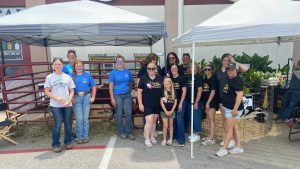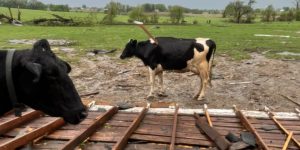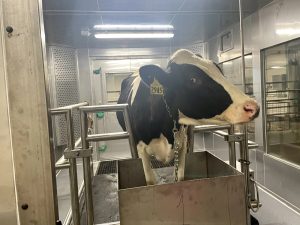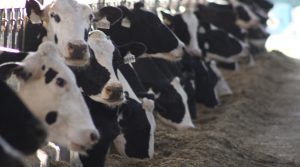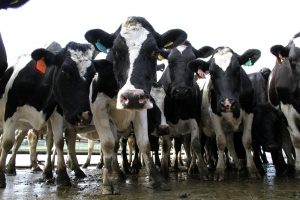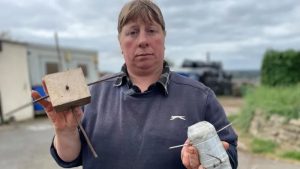
Sinn Féin leader Mary Lou McDonald has criticised the “entire climate debate” being condensed by some to a discussion on the number of cows in the country.
Giving an address at the Irish Creamery Milk Suppliers’ Association’s annual general meeting in Co Limerick on Monday, Ms McDonald said that reducing cow numbers would “do nothing for global emissions” if products derived from Irish cattle were to be “simply replaced on world markets by beef or dairy from higher emitting countries”.
Ms McDonald stressed that where practices employed on farms can effectively reduce emissions, they must be used “to full effect”.
“To those who suggest that farmers must move from dairy – they need to recognise the financial realities as to why that sector has increased over the past decade,” Ms McDonald told the meeting.
“If they want dairy farmers to grow crops or fruit or vegetables, then there must be a viable economic rationale for doing so.
“The answer will never be to do nothing.
“It will always be to do the things that make the most difference in reducing emissions, protecting our water and air quality, producing top-quality food, and re-vitalising our rural communities.”
Pointing the finger at Irish farmers
Ms McDonald said her party, if to enter Government in the future, wants to ensure that every farmer “knows what is expected of them”, by providing an appraisal of the current carbon emission, storage and sequestration on each farm, and then “delivering long-term rewards for farmers to make improvements”.
“Our alternative budget outlined how we would make immediate investments in areas such as low-emission technology by providing grant aid to all including farm contractors, and organics by working to deliver a premium market so that we can reach beyond the pathetic targets by Government,” she added.
Ms McDonald said that pointing the finger at Irish farmers and “blaming them for our climate failures” is not “just wrong – it is unfair and counter-productive”.
She told the event that she feels if there is “any prospect” of the sector achieving its 25% cut in emissions target, “then there must first be recognition of the climate work farmers have already done on their farms”.
“Then it must be clearly spelled out what actions are required at farm level so that farmers can start planning now,” she continued.
“The failure to fully utilise emission-reducing technology lies not with farmers but with Government’s apparent inability to plan and support.”
Ms McDonald commended the resilience of Irish farmers, telling the event that agriculture “is the sector that stays put”, and unlike other sectors, “farmers don’t up and leave at times of financial strife”.
Instead, “farmers help us out of the challenging times”.
“Government must be partners of family farmers,” Ms McDonald said.
“Sinn Féin makes no secret of and makes no apologies for our support for smaller and poorer farmers, those in peripheral regions and on marginal land, those in our suckler and sheep sectors; nor do we fail to appreciate the importance of our dairy sector.
“Yours is a sector that has seen significant growth in recent years.
“It should be noted and appreciated that much of this growth occurred at a time when very little else within our economy was growing.
“Not to put too fine a point on it but the dairy and wider agri-food sectors helped Ireland to come through the financial crisis faster than we would otherwise have done.”
CAP budget
However, Ms McDonald said while dairy is profitable for many, “it’s also a case that the success of the sector hasn’t exclusively translated into benefits for farmers”.
“In many cases, expansion was embarked on only to stand still – like other farm systems, many farmers are producing more foods for similar incomes as to their parents and grandparents as margins are continuously squeezed.”
And while much change awaits the sector, Ms McDonald said it is the role of Government to “ensure that we continue to maintain that pre-eminent reputation for a high-quality sustainable product that has made our country a world leader”.
In Government, she said that Sinn Féin wants to “reverse the continuous cuts to the EU CAP budget”.
“The current Government agreed to an EU budget deal that is bad for Ireland and bad for Irish farming,” she said.
“If we expect farmers to make the type of changes and investments that will be necessary over the next generation then they need more support, not less, and that is why work at EU level to undo the downward trajectory of CAP supports must start now,” she added.
‘Government of change’
Ms McDonald, who told attendees at the event that she wishes to lead a “Government of change” in the future, said that Sinn Féin has a “long track record” of representing farmers.
“It is time for a Government that is committed to reversing the legacy of neglect and the disrespect shown to farmers and to our rural communities for decades,” she said.
“I believe that the vast majority of Ireland’s farmers will be much better off under a Sinn Féin-led government.
“It is the family farm model that makes Irish agriculture different. It’s that model Sinn Féin [is] committed to.
“It was no accident that our party selected agriculture as one of the two ministries that we took in the northern executive, or that we retained that ministry for a full decade, or that one of those to hold that position was Michelle O’Neill, now first minister designate,” she added.




